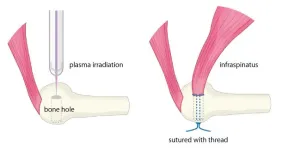(Press-News.org) News coverage of the 2024 election season has often centered on how partisan division has affected our politics. But a new analysis shows that political polarization also poses significant health risks—by obstructing the implementation of legislation and policies aimed at keeping Americans healthy, by discouraging individual action to address health needs, such as getting a flu shot, and by boosting the spread of misinformation that can reduce trust in health professionals.
“Compared to other high-income countries, the United States has a disadvantage when it comes to the health of its citizens,” says Jay Van Bavel, a professor in New York University’s Department of Psychology and an author of the analysis, which appears in the journal Nature Medicine. “America’s growing political polarization is only exacerbating this shortcoming.”
But despite the challenges of political polarization, the analysis, which considered more than 100 experimental papers and reviews, pointed to potential ways to both minimize its impact on Americans’ health and promote health-care practices.
“Division is a major problem and the one real solution is trust. Public health agencies need to work with trusted voices and leaders, being proactive at sharing information, engaging questions, and not writing off concerns as irrelevant,” says Kai Ruggeri, a professor at Columbia University’s Mailman School of Public Health and one of the paper’s authors. “In a time when some people look less to doctors and more to prominent figures for information on decisions related to our health, the best steps involve engaging directly with those voices.”
The analysis, which also included Eric Knowles, a professor in NYU’s Department of Psychology, and Shana Kushner Gadarian, a professor in Syracuse University’s Department of Political Science, considered Americans’ views of the opposite party over four decades, health-related behaviors during the coronavirus pandemic, and comparative data from other countries.
Over the past four decades, the paper’s authors note, partisan animosity has steadily increased in the US. By 2020, Americans were much more likely to say they “hate” the opposite party than they were to say they “love” their own party; by contrast, from 1980 through 2008, Americans were more likely to say they loved their own party than they were to say they hated the opposite party—though “party love” relative to “opposite party hate” has drawn closer virtually every year since 1980, becoming approximately even in 2012 and with “hate” surpassing “love” beginning in 2016.
In their analysis and review of previous studies, the paper’s authors also examined a range of health-care related studies, which showed the following:
As individuals move further from the political center—in either direction—there is a deterioration in individual and public health, such as trust in medical expertise, participation in healthy behaviors, and preventive practices, ranging from healthy diets to vaccination. Notably, individuals who are more ideologically extreme than their state’s average voter have worse physical and mental health.
Polarization affects what health information people are willing to believe and shapes the relevant actions they are willing to take. This may mean disregarding accurate information or believing misinformation—depending on whether or not it comes from sources they are aligned with or disagree with.
Political leaders, inside and outside the US, may make public health worse by linking health behavior to partisan identity rather than medical needs or expert advice, thereby undercutting the role of expertise and ignoring approaches grounded in science, often leading to attacks on medical professionals and the healthcare system.
Republicans were less likely to enroll in marketplace insurance plans through the Patient Protection and Affordable Care Act (“Obamacare”) than were Democrats after most of its provisions took effect a decade ago. These differences have been linked to excess sick days from work, higher healthcare premiums, and higher mortality rates.
As policy polarization at the state level has increased over time, so has the difference in lifespan and health across states—Americans who live in states with more progressive social policies, such as generous Medicaid coverage, higher taxes on cigarettes, more economic support (e.g., a higher minimum wage), and more firearm regulations live longer than their counterparts in states that embrace more conservative policies.
After the Trump administration and other Republican leaders expressed skepticism regarding COVID-19 prevention behaviors, partisan elites and news sources amplified this belief and polarized Republicans readily accepted it: large gaps in distancing and then vaccination rates between Republicans and Democrats widened during the pandemic, even as evidence mounted about the risks.
These differences were not limited to the US: a previous study of 23 European countries found that national levels of partisan polarization accounted for nearly 39% of the variation in vaccination levels.
Notably, another study of 67 countries found almost no correlation at all between left/right political ideology and support for public health recommendations, suggesting that polarization, rather than political ideology, was the greater risk factor to their citizens’ health.
The authors write that “although polarization is a risk factor for disease and mortality in a public health crisis, this outcome is not inevitable.” They point to a study comparing the US and Canada that suggests policy and leadership decisions can mitigate the potential harm from polarization. Although both nations were politically polarized at the onset of the pandemic, research found that political leaders in Canada took a different approach to those in the United States and also experienced a significantly lower level of illness and mortality.
This and other studies point to specific approaches public officials and health-care professionals can take, which the Nature Medicine authors outline:
Highlight shared identities between public health officials and target populations—these can include shared partisan identities, nonpartisan identities, or national identities.
Communicate information about how many people are following public health guidelines—instead of focusing on people who are failing to follow it.
Use trusted civic leaders—such as religious, athletic, and military spokespersons—to expand and supplement health messages from local and national leaders and reach diverse communities.
Debunk misleading or false information using fact checks, pre-bunking, and other validated strategies
“Polarization is not only an American concern, but one that is increasing in many countries,” says Syracuse’s Gadarian. “This means we should be investing more in understanding and diminishing its impact on public health by encouraging collaborations between medical professionals and social scientists.”
# # #
END
Political polarization poses health risks, new analysis concludes
Division stymies policymaking and implementation of healthcare programs, discourages individual action to take remedies, and fosters spread of misinformation
2024-10-25
ELSE PRESS RELEASES FROM THIS DATE:
Lymph node-like structures may trigger the demise of cancer tumors
2024-10-25
**EMBARGOED FOR RELEASE UNTIL OCT. 25 AT 5 A.M. ET**
A newly described stage of a lymph node-like structure seen in liver tumors after presurgical immunotherapy may be vital to successfully treating patients with hepatocellular carcinoma, according to a study by researchers from the Johns Hopkins Kimmel Cancer Center.
The study, published Oct. 25 in Nature Immunology, provides new information about lymph node-like structures called tertiary lymphoid structures. These structures, which are highly organized ...
Pitchers rejoice? Plasma irradiation might prevent tendon re-tears
2024-10-25
The human body, filled with muscles and moving parts, is far from indestructible. Injuries are common, especially where tendons and bones connect. In Japan, rotator cuff tears affect approximately 1 in 4 people over age 50, and reports state that even after surgery, about 20% of cases result in re-tears. To combat this, new healing methods to bolster current clinical practices are needed.
Graduate student Katsumasa Nakazawa, Associate Professor Hiromitsu Toyoda, and then Professor Hiroaki Nakamura at Osaka Metropolitan University’s ...
The clinical significance of microvascular inflammation after kidney transplantation
2024-10-25
San Diego, CA (October 24, 2024) — Investigators recently uncovered key insights into newly defined rejection entities in kidney transplantation that may offer improved patient risk categorization post-transplant. The research will be presented at ASN Kidney Week 2024 October 23– 27.
Kidney transplant rejection continues to threaten the long-term success of kidney transplants, with microvascular inflammation (inflammation within capillaries) playing a pivotal role in graft failure. Due to its complex nature, this inflammation poses a major challenge in clinical practice. In response, the international Banff classification—the ...
The Lancet Public Health: New Commission calls for regulatory reform to tackle the health impacts of the rapid global expansion of commercial gambling
2024-10-24
**Embargo: 23.30 [UK time] / 06.30pm [US ET] Thursday 24th October 2024**
Peer reviewed / Literature review, systematic review and meta-analysis, opinion / People
Embargoed access to the Commission report and contact details for authors are available in Notes to Editors at the end of the release.
The Lancet Public Health: New Commission calls for regulatory reform to tackle the health impacts of the rapid global expansion of commercial gambling
Gambling harms are far more substantial than previously understood, exacerbated by rapid global expansion ...
Scientists create cancer patients’ ‘digital twins’ to predict how well treatments may work
2024-10-24
Barcelona, Spain: Researchers have shown that they can accurately re-create clinical trials of new treatments using ‘digital twins’ of real cancer patients. The technology, called FarrSight®-Twin, which is based on algorithms used by astrophysicists to discover black holes, will be presented today (Friday) at the 36th EORTC-NCI-AACR [1] Symposium on Molecular Targets and Cancer Therapeutics in Barcelona, Spain.
The researchers say that this approach could be used by cancer ...
New ‘mini-protein’ carries radiation dose directly to tumours without harming healthy tissues
2024-10-24
Barcelona, Spain: Researchers have shown for the first time that it is possible for a specially-designed ‘mini-protein’ to deliver a radiation dose directly to tumour cells expressing a protein on their cell surfaces called Nectin-4, which is often found in a number of different cancers.
In a study presented on Friday at the 36th EORTC-NCI-AACR [1] Symposium on Molecular Targets and Cancer Therapeutics in Barcelona, Spain, Mike Sathekge, Professor and Head of the Nuclear Medicine Department at the University of Pretoria ...
Patients with advanced bladder cancer with alterations in the FGFR3 gene respond well to investigational drug, TYRA-300
2024-10-24
Barcelona, Spain: Patients with advanced bladder cancer that had spread to other parts of the body (metastasised) have responded well in a phase I clinical trial of an investigational drug, TYRA-300. The drug targets changes in the FGFR3 gene that drive tumour growth in about 10%-20% of these patients.
Associate Professor, Ben Tran, a medical oncologist at Peter McCallum Cancer Centre in Melbourne, Australia, presented the first results as of 15 August 2024 from 41 patients enrolled in the SURF301 study in a late-breaking oral presentation at the 36th EORTC-NCI-AACR [1] Symposium on Molecular Targets and Cancer Therapeutics ...
Researchers find key genetic mutations in bowel cancer cells that lead to resistance to WRN inhibitors
2024-10-24
Barcelona, Spain: Researchers have discovered key mutations in certain cancer cells that make them resistant to WRN inhibitors, a new class of anti-cancer drugs. The yet-to-be-published findings are presented on Friday at the 36th EORTC-NCI-AACR [1] Symposium on Molecular Targets and Cancer Therapeutics in Barcelona, Spain.
Werner helicase (WRN) inhibitors are already being evaluated in phase I clinical trials in patients with tumours that have microsatellite instability (MSI) – a condition in which the genes responsible for monitoring and repairing mistakes in DNA replication stop functioning, and errors are introduced. This is also ...
Millions in the U.S. may rely on groundwater contaminated with PFAS for drinking water supplies
2024-10-24
PEMBROKE, N.H. — Approximately 71 to 95 million people in the Lower 48 states – more than 20% of the country’s population – may rely on groundwater that contains detectable concentrations of per- and polyfluoroalkyl substances, also known as PFAS, for their drinking water supplies. These findings are according to a U.S Geological Survey study published Oct. 24.
The predictive model results can help members of the public, water suppliers and regulators understand the potential for PFAS contamination, guide future studies and inform strategic planning for water resources.
USGS scientists are the first to ...
Human actions cause insect color change
2024-10-24
New Zealand’s native stoneflies have changed colour in response to human-driven environmental changes, new research shows.
Just published in the journal Science, the University of Otago study provides arguably the world’s most clear-cut case of animal evolution in response to change made by humans.
Co-author Professor Jon Waters, of the Department of Zoology, says the stonefly has become a different colour due to recent deforestation.
“In natural forested regions, a native species has evolved ‘warning’ colours that mimic those of a poisonous forest species, to trick predators into ...
LAST 30 PRESS RELEASES:
Ketamine high NOT related to treatment success for people with alcohol problems, study finds
1 in 6 Medicare beneficiaries depend on telehealth for key medical care
Maps can encourage home radon testing in the right settings
Exploring the link between hearing loss and cognitive decline
Machine learning tool can predict serious transplant complications months earlier
Prevalence of over-the-counter and prescription medication use in the US
US child mental health care need, unmet needs, and difficulty accessing services
Incidental rotator cuff abnormalities on magnetic resonance imaging
Sensing local fibers in pancreatic tumors, cancer cells ‘choose’ to either grow or tolerate treatment
Barriers to mental health care leave many children behind, new data cautions
Cancer and inflammation: immunologic interplay, translational advances, and clinical strategies
Bioactive polyphenolic compounds and in vitro anti-degenerative property-based pharmacological propensities of some promising germplasms of Amaranthus hypochondriacus L.
AI-powered companionship: PolyU interfaculty scholar harnesses music and empathetic speech in robots to combat loneliness
Antarctica sits above Earth’s strongest “gravity hole.” Now we know how it got that way
Haircare products made with botanicals protects strands, adds shine
Enhanced pulmonary nodule detection and classification using artificial intelligence on LIDC-IDRI data
Using NBA, study finds that pay differences among top performers can erode cooperation
Korea University, Stanford University, and IESGA launch Water Sustainability Index to combat ESG greenwashing
Molecular glue discovery: large scale instead of lucky strike
Insulin resistance predictor highlights cancer connection
Explaining next-generation solar cells
Slippery ions create a smoother path to blue energy
Magnetic resonance imaging opens the door to better treatments for underdiagnosed atypical Parkinsonisms
National poll finds gaps in community preparedness for teen cardiac emergencies
One strategy to block both drug-resistant bacteria and influenza: new broad-spectrum infection prevention approach validated
Survey: 3 in 4 skip physical therapy homework, stunting progress
College students who spend hours on social media are more likely to be lonely – national US study
Evidence behind intermittent fasting for weight loss fails to match hype
How AI tools like DeepSeek are transforming emotional and mental health care of Chinese youth
Study finds link between sugary drinks and anxiety in young people
[Press-News.org] Political polarization poses health risks, new analysis concludesDivision stymies policymaking and implementation of healthcare programs, discourages individual action to take remedies, and fosters spread of misinformation




